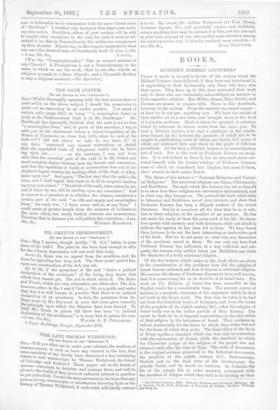THE OATH SYSTEM.
[To TEE EDITOR OF THD " $pscrwron."] Sms—Whilst thoroughly agreeing with the last sixteen lines of your article on the above subject, I should like permission to point out an inaccuracy in an earlier portion. You speak of 'certain oaths (page 1221) as being "'a meaningless form,' as truly as the Parliamentary Oath is to Mr. Biadlaugh." Mr. Braellaugh has repeatedly declared that the oath is not to him "a meaningless form," and, in proof of this assertion, I bog to refer you to his statements before a Select Committee of the House of Commons, on June 2nd, 1880, when he said of the oath :—" I did not refuse to take it, nor have I," at any time, " expressed any mental reservation, or stated that the appointed Oath of Allegiance would not be bind- ing upon me on the contrary, I say, and have said, that the essential part of the oath is in the fullest and most complete degree binding upon my honour and conscience, and that the repeating of words of asseveration does not in the slightest degree weaken the binding effect of the Oath of Alleg- iance upon me." And again, "The law says that the oath is the form, and I shall regard that form as in all its respects binding upon my conscience." "The whole of the oath, when taken by me, and if taken by me, will be binding upon my conscience." And in answer to a question as to whether the witness considered a certain part of the oath "an idle and empty and meaningless form," the reply was, "I have never said so, at any time." I could quote at greater length from the minutes of evidence to the same effect, but surely further extracts are unnecessary. Trusting that in fairness you will publish this correction,—I am,


































 Previous page
Previous page